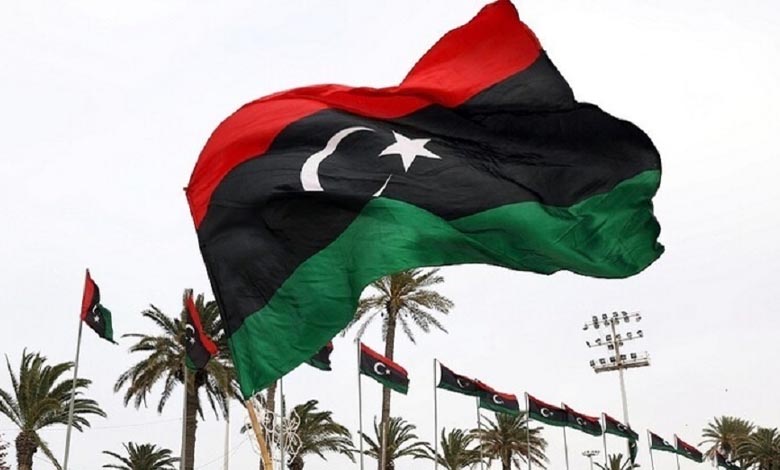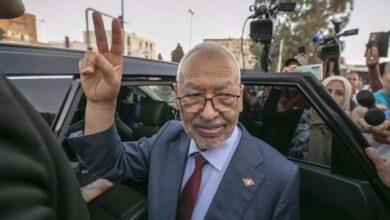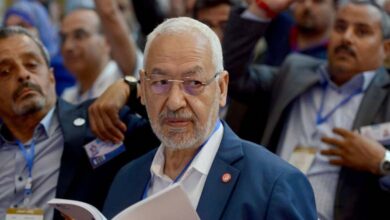Eastern Libyan government rejects Washington’s support for Dbeibeh in the oil file

The government assigned by the parliament has not found it appropriate to involve the United States in the conflict over oil revenues in Libya, which has resurfaced as an attempt to pave the way towards understanding between the Libyan factions. The government of Osama Hamad considered it a bias towards the expired Government of National Unity and called on the American envoy to respect the sovereignty of the judiciary.
The head of the government supported by the Libyan parliament described the statements of the U.S. special envoy to Libya, Richard Norland, regarding the warning of closing oil facilities, as a “blatant interference in the affairs of the Libyan state and based on supporting one party benefiting from squandering the people’s money.”
Hamad clarified in a tweet on his Twitter account that when they raised the red flag to stop the flow of oil revenues and put them under judicial custody, their intention was that in case the relevant institutions in Tripoli did not comply with the judiciary’s rulings and decisions to preserve the Libyan people’s resources, which the expired government wasted for free, they would take further steps to safeguard the state’s funds and stop the corrupt.
He called on the U.S. special envoy to Libya to “respect the sovereignty of the Libyan judiciary and not to interfere in favor of any party, and not to prioritize foreign interests over the interests and rights of the Libyan people.”
He explained that “the real danger is not in stopping oil revenues or their exports but in stealing and wasting the money under international auspices.”
He also urged the U.S. envoy not to prioritize foreign interests over the interests and rights of the Libyan people and not to make media statements without knowing the reality of the matter.
Hamad encouraged the Council of Deputies and the state to accelerate practical steps towards presidential and parliamentary elections and the formation of a unified executive authority to manage the country and its resources.
The U.S. special envoy to Libya had called on the political parties in the country on Friday to avoid closing oil facilities, warning of its devastating repercussions on the Libyan economy.
According to a statement by the U.S. embassy in Libya, Norland said, “The United States calls on Libyan political actors to refrain from threatening to close oil facilities, which could have a devastating impact on the Libyan economy and harm all Libyans.”
He urged Libyan leaders to adopt a comprehensive mechanism to manage revenues as a constructive way to address issues related to oil revenue distribution and to ensure transparency without undermining the safety of the Libyan economy or the neutrality of the National Oil Corporation.
This came in response to threats made by the government assigned by the parliament last Wednesday to halt oil production and exports if the judicial guard is not allowed to carry out its duties and monitor the accounts and funds of the National Oil Corporation.
On June 24, the government assigned by the Libyan House of Representatives threatened to suspend oil exports by resorting to the judiciary, amid a conflict over revenues with the expired Government of National Unity led by Abdul Hamid Dbeibeh.
Libya has been facing a political crisis since last year when the parliament refused to authorize the Government of National Unity in Tripoli, and it was tasked with forming a new government that was unable to take control in the capital. Recently, its president, Fathi Bashagha, was removed and replaced by Osama Hamad.
The government supported by the parliament accuses the Government of National Unity in Tripoli of squandering public funds and using oil revenues to buy loyalty inside and outside the country to remain in power. They demand the administrative seizure of the oil funds deposited in the accounts of the National Oil Corporation, the Central Bank, and the Libyan Foreign Bank.
The government assigned by the parliament said in a statement that it “completed the administrative seizure procedures for oil revenues for the year 2022 and beyond, which amount to more than 130 billion dinars (about 27 billion dollars) based on the constitutional declaration principle of fair wealth distribution.”
Administrative seizure is a measure taken by government authorities without resorting to the judiciary, and it is directly executed against any individual or entity, being a privilege reserved only for the public authority.
The issue of fair distribution of Libyan oil revenues is one of the crises in the country, where the government appointed by the House of Representatives is in dispute with the Dbeibeh government over control of these revenues.
Last Monday, Hamad met with the Chairman of the National Oil Corporation, Farhat Bengdara, in Benghazi, where they discussed the issue of revenues, oil returns, production, and export, according to a statement from the government.
The meeting addressed “the mechanisms for implementing the House of Representatives’ decision regarding the distribution of national wealth, in order to ensure the rights of citizens to a decent life and the provision of essential services, education, and health,” according to the statement.
The government appointed by the House of Representatives controls over 65% of Libya’s oil production, and any disruption of oil flows will have negative consequences on the Libyan economy, which is already facing a precarious situation that cannot tolerate further crises.
Since the 2011 uprising supported by NATO, oil in Libya has often been subject to blockade, leading to years of war and chaos. Local groups and major factions cut off supplies as part of political tactics to exert pressure on the opposing party.
The last major blockade was lifted by the Libyan army last year when a new leadership was appointed to the National Oil Corporation in Tripoli, which was considered close to the army chief, Marshal Khalifa Haftar.
The United Nations is sponsoring an economic dialogue among Libyans, aiming to unify the divided economic institutions and develop a plan for the fair distribution of oil revenues, which constitute the country’s entire income.
Diplomatic efforts to achieve a permanent resolution to the conflict in Libya are focused on holding national elections, a goal that all parties claim to support but has been consistently hindered by disagreements over electoral rules and temporary control of the government.
On June 17th, the army chief announced his support for an initiative by the Eastern Parliament to appoint a new administration, in clear defiance of the Tripoli-based Government of National Unity.
About two weeks ago, an Eastern Libyan court ruled in favor of Hamad’s government in a case against the National Oil Corporation, allowing them to take control of the company’s accounts.
Observers believe that the return of conflicts over oil revenues is due to the precarious economic situation in the country, the rivalries between political factions, and the struggle for power and control.
The issue of fair distribution of Libyan oil revenues is one of the crises in the country, where the government appointed by the House of Representatives is in conflict with the Dbeibeh government over control of these revenues.
Last Monday, Hamad met with the President of the National Oil Corporation, Farhat Bengdara, in Benghazi, where they discussed the issue of revenues, oil returns, production, and export, according to a statement from the government.
The meeting addressed “mechanisms for implementing the decision of the House of Representatives regarding the distribution of national wealth, to ensure the rights of citizens to a decent life and the provision of basic services, education, and health,” according to the statement.
The government appointed by the House of Representatives controls over 65% of Libya’s oil production, and any disruption of oil flow would have negative impacts on the Libyan economy, which is already facing a dire living situation that cannot tolerate further crises.
Since the 2011 uprising supported by NATO, oil in Libya has been subject to blockades, leading to years of war and chaos. Local groups and major factions cut off supplies as part of political tactics to exert pressure on the opposing party.
The last major blockade was lifted by the Libyan army last year when a new head was appointed for the National Oil Corporation in Tripoli, reportedly close to the army commander, Marshal Khalifa Haftar.
The United Nations is facilitating an economic dialogue among Libyans aimed at unifying the divided economic institutions and devising a plan for the fair distribution of oil revenues, which the country heavily relies on for its expenditures.
Diplomatic efforts to achieve a permanent resolution to the conflict in Libya are focused on moving towards national elections, a goal that all parties claim to support but has been repeatedly frustrated by disagreements over election rules and temporary control of the government.
The army commander stated on June 17th that he supports a move by the Eastern Parliament to appoint a new interim administration, in clear defiance of the Government of National Unity in Tripoli.
About two weeks ago, a court in eastern Libya issued a ruling in favor of the Hamad government in a case against the National Oil Corporation, allowing it to take control of the company’s accounts.
Observers believe that the resurgence of the conflict over oil revenues stems from the fear of some parties, particularly the House of Representatives, that Dbeibeh would use those revenues for electoral purposes. The Prime Minister of the Government of National Unity aims to participate in the upcoming elections if they are held.
Earlier this month, the Speaker of the House of Representatives, Aguila Saleh, announced the formation of a committee to restructure the budget distribution. Saleh called for “depositing the first percentage in the financial accounts held by the Central Bank of Libya in Tripoli, and depositing the second percentage in the financial accounts held by the Central Bank of Libya in Benghazi, with the deposit and transfer process deducting these percentages directly from oil, gas, and derivative revenues.”
According to the announcement, the committee is chaired by the President of the National Oil Corporation, Farhat Bengdara, in addition to the membership of two representatives from the western and eastern branches of the Central Bank, as well as the Audit Bureau and the Administrative Control Authority.
The announcement came after the Chairman of the Energy Committee in the House of Representatives, Issa Al-Aribi, submitted a request in a council session to halt the flow of oil, accusing the Government of National Unity in Tripoli of disposing of oil revenues without benefiting other regions of the country, particularly the east and south of Libya, as he expressed.
Observers believe that the movement of the eastern government and parliament towards ending Dbeibeh’s control over oil revenues may lead to an explosion this time, as it is unlikely that the latter would accept the removal of one of his important cards and weapons in asserting himself as the difficult number in the existing equation.
Previous episodes of conflict in Libya and political maneuvers have focused on controlling the large energy revenues of the OPEC member country, as they are the main source of state income.
Under internationally recognized agreements, the National Oil Corporation is the sole legal producer and source of Libyan oil, and sales must be conducted through the Central Bank of Libya, which is on par with the corporation and is based in Tripoli.
Throughout the conflict in Libya, the corporation has operated throughout the country regardless of the frontlines, and the central bank continues to pay salaries, including the salaries of many fighters from both competing sides across the country.












